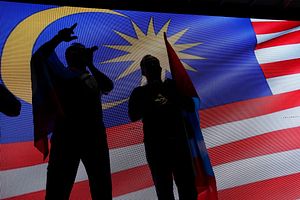On Tuesday, Malaysian lawmakers successfully voted to lower the country’s voting age from 21 to 18. This will see millions of voters added to the electoral register, taking Malaysia’s total number of voters from the 14.9 million seen at the 2018 General Election to 22.7 million voters by the 2023 General Election.
In addition to lowering the voting age, the constitutional amendment also includes provisions to automatically add 18 year olds onto the electoral roll and to lower the minimum age for individuals to stand as candidates for parliament to 18.
As passing the bill required changing the constitution, the Pakatan Harapan government needed a two-thirds majority of the Dewan Rakyat, Malaysia’s lower house, or 148 lawmakers of the total 222 members.
This was achieved with unanimous support from the opposition after Prime Minister Mahathir Mohamad and Sports Minister Syed Saddiq agreed to include the demands of opposition Islamic Party PAS into the bill. These demands included the addition of automatic voter registration and lowering the age for candidates to be eligible to stand for Parliament.
After successfully securing PAS’s support, this left the opposition coalition Barisan Nasional with no other choice but to back the bill, in an attempt to keep PAS onside amid ongoing negotiations that will consolidate a formal alliance between the two opposition parties.
For the ruling government, this legislative victory will see Pakatan Harapan deliver on a key election promise, allowing it to reaffirm its reformist agenda and move on from its by-election losses of the last 12 months.
It will also serve to boost the ruling coalition’s electoral prospects at the 2023 General Election, as younger voters overwhelmingly chose to vote for Pakatan Harapan rather than Barisan Nasional at the 2018 General Election.
More broadly, Pakatan Harapan is hoping that these changes will serve to balance against predicted losses in regional constituencies. Protest votes over former Prime Minister Najib Razak’s alleged involvement in the 1MBD scandal had helped the ruling government pick up seats at the 2018 General Election, but that support is expected to dissipate.
Meanwhile, PAS anticipates that these legislative changes will help mobilize the electoral support of voters graduating from PAS-affiliated religious schools. In addition, PAS will also be hoping to capitalize on the fresh increase of eligible Malay voters created by the changes, gambling that this will translate to more seats in the 2023 General Election.
Barisan Nasional has the least to gain from these changes because of a lingering trust deficit with Malaysia’s youth caused by the ongoing effects of the 1MDB scandal. Nevertheless, in the long term there is scope for Barisan Nasional to benefit from the changes. If Pakatan Harapan’s reform agenda stalls, frustrated youths may choose to abandon the ruling government and shift their support back behind Barisan Nasional.
With this in mind, any failure by Pakatan Harapan to address youth sensitive issues such as youth unemployment, which currently sits at around 11 percent for 15 to 21 year olds, could see the ruling coalition become exposed to attacks from PAS and Barisan Nasional. Therefore, Pakatan Harapan will need to focus on delivering education and employment opportunities for Malaysia’s youth so as to avoid this potentially costly outcome.
These legislative changes may serve to enrich Malaysia’s democracy by creating a new demographic of swing voters interested in policy debates on jobs, health, and housing. Nevertheless, the role of vote buying, patronage arrangements, and race politics in Malaysia is unlikely to fade away anytime soon.
Marcus Tantau is an Australian postgraduate student at the Australian National University, undertaking a Master’s of National Security Policy.

































